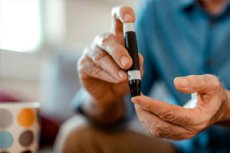New publications
The risk of type 2 diabetes is higher in people who are regularly sleep deprived
Last reviewed: 29.06.2025

All iLive content is medically reviewed or fact checked to ensure as much factual accuracy as possible.
We have strict sourcing guidelines and only link to reputable media sites, academic research institutions and, whenever possible, medically peer reviewed studies. Note that the numbers in parentheses ([1], [2], etc.) are clickable links to these studies.
If you feel that any of our content is inaccurate, out-of-date, or otherwise questionable, please select it and press Ctrl + Enter.

People who regularly sleep five hours or less per night are at higher risk of developing type 2 diabetes, regardless of their diet, according to a new study published in the journal jAMA Network Open.
Researchers used data from 247,867 participants aged 38 to 71 years, with an average age of 56 years, from uK Biobank to examine the association between sleep duration, dietary habits and type 2 diabetes. The average follow-up period for the study was 12 years. During this time, 3% (7,905) of the participants developed type 2 diabetes.
Researchers noted that long periods of inadequate sleep can contribute to a variety of health problems, including an increased risk of developing type 2 diabetes. They found that people who slept 5 hours or less per day had a higher risk of type 2 diabetes compared to those with normal sleep duration.
"It's not surprising to me," said Dr. Puja ShafipourPuja Shafipour, an obesity specialist at Providence Saint John's Health Center in California who was not involved in the study.
"When you don't sleep well or enough, your insulin levels can be disrupted. The next day you may be hungrier than usual, so your food intake is also disrupted. On a long run, this can contribute to diabetes," Shafipour said.
Type 2 diabetes risk, diet and exercise
Researchers noted that a healthy lifestyle can reduce the risk of diabetes.
They conducted a small study 2021, showing that high-intensity exercise reduces the risk of developing type 2 diabetes.
In addition, they noted that a population-based cohort study, also using participants from UK Biobank, showed that individuals with short sleep duration who engage in regular physical activity may reduce their risk of developing diabetes.
"Exercise directly affects skeletal muscles that are important for regulating blood glucose levels. They stimulate the expression of glucose transporters in these muscles, improving glucose uptake from the bloodstream," said Dr. christian Benedikttitle="Christian Benedict - Uppsala University">One of the study authors and an assistant professor in the Department of Pharmaceutical Biology at Uppsala University in Sweden. "While maintaining a healthy diet, such as eating more complex carbohydrates, also has a positive effect on blood sugar levels, its effects may not be as significant as those of exercise in counteracting impaired blood glucose control caused by insufficient sleep."
But not everyone agrees with that assessment.
"I don't disagree that vigorous exercise can reduce the risk of diabetes - perhaps in the short term - but I don't believe it can replace regular sleep," Shafipour said. "Diet and exercise are important - but so is sleep."
Limitations of the study on type 2 diabetes and sleep
The researchers didn't look at different types of diets, so it's not clear if a diet such as the Mediterranean diet would reduce the risk of diabetes in people with short sleep duration.
In addition, this study did not look at macronutrients and micronutrients, so it is unknown whether they can offset the effects of the
